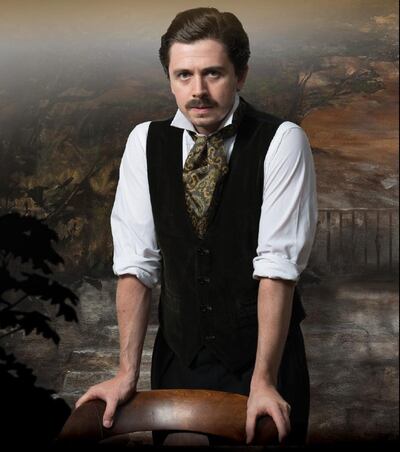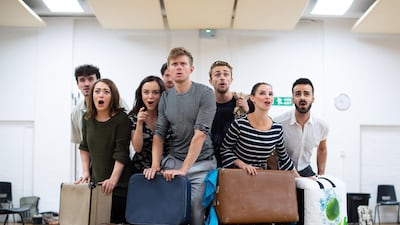A musical adaptation of acclaimed Lebanese poet Kahlil Gibran's 1912 work The Broken Wings is making its debut in London's West End this week, written by Lebanese-British actor and writer Nadim Naaman.
Unlike Gibran's most famous work The Prophet, this is the first time The Broken Wings has been adapted into a musical, an opportunity Naaman was not going to pass up. "I couldn't believe my luck that nobody had already adapted it into a musical," he tells The National.
"Gibran is a Lebanese icon and the greatest ambassador of our artistic and literary heritage. I grew up in a house with his words hanging on our walls. I heard his poetry at weddings and funerals, and we had numerous copies of The Prophet scattered around. His poetry often references music and song, and his themes are so universal – wonderful ingredients for a stage adaptation."
Broken Wings, which is adapted from the poetic novel of the same name, tells the tale of a young Gibran returning to Lebanon after years away in America. The tragic love story, often called the Romeo and Juliet of the Middle East, sees the teenage poet fall head over heels for Selma Karamy, the daughter of a family friend, who is already betrothed to the nephew of a powerful bishop.

Naaman collaborated with Qatari composer Dana Alfardan on the music for the production, which is being showcased over four nights at the Theatre Royal Haymarket in the British capital. Best-known in theatre circles for playing Raoul in the 30-year anniversary production of The Phantom of The Opera, Naaman also stars in the musical as an ageing Gibran, narrating the story from a cold apartment in New York.
As someone with strong links to the region (aside from his Lebanese background he spent time in Oman, and his parents met while working in Dubai in the 1970s), Naaman knows expectations for the musical will be high. "There is a certain amount of pressure because so many Middle Easterners have their opinions on Gibran. You can't please everyone when taking on a figure of Gibran's magnitude. But the response so far has overwhelmingly been one of positivity and pride – pride that someone is finally telling Gibran's story on the West End stage, and pride that the Middle East can now have a musical of its own, rather than relying on imports of the West End and Broadway regulars again and again."
The cast rehearsing:
Despite writing over a century ago, Gibran's work has enduring appeal thanks to its modern approach to issues still discussed in mainstream culture today. The Prophet examines love, work, family and death, The Broken Wings looks at topics including gender inequality, immigration and organised religion.
"Its relevance is perhaps the most striking thing about Broken Wings. Here was a man writing in 1912 about the ill-treatment of women in society, pining for gender equality. The power of the story mostly lies in the fact that there are still millions of people who endure similar fates to Young Gibran and Selma Karamy."
While Gibran’s writings still resonate with a modern-day audience, Naaman believes a lot can also be learned from how the poet, a Christian who believed in the unity of all religions, lived his life.
“Kahlil Gibran was an immigrant from Greater Syria who, like many others, was welcomed with open arms into the United States in 1898. You have to ask, if Gibran were making that Trans-Atlantic crossing today, would he even make it through customs?”
“The West, as much as The Middle East, could do with a hefty dose of Gibran’s tolerant and humanitarian outlook on life.”
Broken Wings runs from August 1-4 at Theatre Royal Haymarket in London


